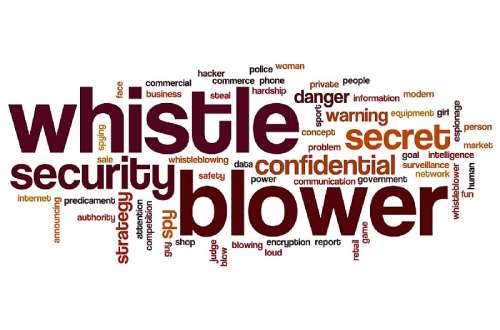The National Commission for Civic Education is tasking Ghanaians not to allow anything to deter them from acting as whistleblowers in the country.
Deputy Central Regional Director of the NCCE, Madam Mercy Essien is of the view that so long as detailed protection and rewards for whistleblowers exist in the Whistleblowers Act 2006 (Act 720), Ghanaians must actively play their role as strong whistle-blowers.
Passed by Parliament earlier this year, the Whistleblowers Act 2006 (Act 720), aims to establish mechanisms to encourage citizens to come forward with information on corruption, fraud, or other illicit activities.
It provides legal protection for whistleblowers while shielding them from any retaliation or victimization and also safeguards their identity after exposing any wrongdoings of others.
The Act also offers whistleblowers financial rewards as an incentive for reporting credible information that leads to the recovery of assets or the prevention of financial loss.
With this, such people receive a percentage of the recovered or saved amount to encourage more people to step forward, bolstering anti-corruption efforts across the country.
In an interview on the Atlantic Wave, Madam Mercy Essien in educating the public asserted that Ghanaians must not fear reporting the issues above be it at their workplace, environments, and churches among other places they may find themselves.
“When you see something, you say something… So, when you see something or hear that any illegal practice going on, go to institutions that handle such cases for needed action to be taken.”
She said it is also important for institutions handling such investigations to comply with the reward advantage for the whistleblowers in the Whistleblowers Act 2006 (Act 270).
In Ghana, Institutions such as the Office of the Office of the Special Prosecutor (OSP), Commission on Human Rights and Administrative Justice (CHRAJ), and Financial Intelligence Centre (FIC) play the role of dealing with information from whistleblowers.
These institutions play a network together with the Internal Audit Agency (IAA), the Ghana Anti-Corruption Coalition (GACC), the Ghana Police Service, Economic and Organized Crime Office (EOCO) to ensure such information, tabled before them is addressed.
Madam Mercy Essien maintains that the investigative bodies must ensure that they lay bare on the table, the outcome because then it should encourage them to come out again.
The Cape Coast Metro Director of the NCCE, Mr. Joseph Abban stressed that it is crucial such institutions ensure the total protection of whistleblowers.
He explained that the institution’s refusal in this regard would prevent prospective whistleblowers from doing the needful when they see illegal practices or corruption-related activities among others.
To him, Ghanaians have a collective responsibility to ensure that corruption and all its related illegal activities are reduced in the country and the investigative bodies must assist them in that regard.
Read more stories here




























